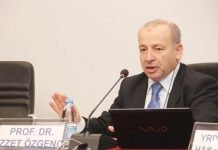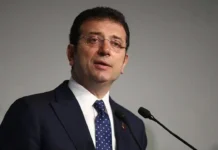
Dozens of people including two deputies and three journalists were detained on Thursday in operations targeting the pro-Kurdish Peoples’ Democratic Party (HDP) across Turkey’s several provinces ahead of Nevruz celebrations.
Nevruz is a spring festival traditionally marked in the second half of March and has a highly symbolic meaning for Kurds, with colorful celebrations across the predominantly Kurdish Southeast of Turkey. But the celebrations also frequently in the past became the scene for clashes between police and demonstrators.
Dihaber reporter Hayri Demir was detained in Ankara and journalist Cüneyt Yavuz was detained in İstanbul, while the general manager of Radyo Dünya, which has been closed down by the government, was detained in Adana. It is not yet known on which charges the journalists were detained because of the confidential nature of the investigation. Police teams even raided the house of newspaper distributor Hakan Ergün, who used to work for the now-closed Özgür Gündem daily and was jailed eight months ago.
The operations were conducted in Antalya, Adana, İstanbul, İzmir, Hatay and Mardin provinces. Among the detainees is Yuhanna Aktaş, head of the Mardin Assyrian Foundation and president of the Nevruz Organizing Committee. In the meantime, the İstanbul and Ankara Governor’s Offices have banned scheduled Nevruz celebrations in the Bakırköy Public Bazaar and Kolej Square, respectively, on March 19.
2 HDP DEPUTIES DETAINED IN ARDAHAN DURING ‘NO’ CAMPAIGN FOR REFERENDUM
Meanwhile, two deputies from the pro-Kurdish HDP Berdan Öztürk and Mehmet Emin Adıyaman were detained on Thursday as they were holding a campaign rally in the eastern province of Ardahan against a constitutional reform package that will be put a public vote in April. The deputies were taken to the Ardahan Courthouse for questioning.
Turkey has stepped up political pressure on Kurdish politicians in recent months. In addition to appointment of trustees to the management of scores of municipalities, Turkey has arrested dozens of Kurdish politicians including 13 HDP deputies and the party’s co-chairs.
Turkey has been highly polarized over the referendum, with many government officials accusing potential naysayers of siding with terror organizations and coup plotters.
In January, Turkey’s Parliament passed the constitutional amendments, later approved by Turkey’s autocratic President Recep Tayyip Erdoğan, that would transform the political order into an executive-style presidential system, effectively widening the scope of powers of the position.
The ruling Justice and Development Party (AKP), backed by the Nationalist Movement Party (MHP), pushed through the legislation that President Erdoğan says will bring the strong leadership needed to prevent a return of the fragile coalition governments of the past.
The Republican People’s Party (CHP) and pro-Kurdish Peoples’ Democratic Party (HDP) fear the reform will fuel authoritarianism.
Parliament’s approval paved the way for a nationwide referendum on the amendments, which would give the president, a traditionally more ceremonial role, the power to dismiss ministers and Parliament, issue decrees, declare emergency rule and appoint figures to key positions, including the judiciary. It would also allow the president to be a member of a political party, which is currently prohibited under the constitution as the presidency is expected to exercise impartiality. (SCF with turkishminute.com) March 16, 2017














